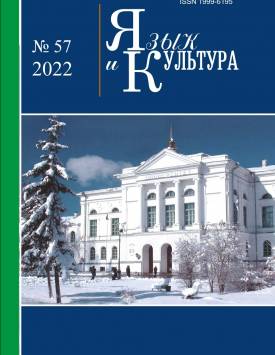Multiplicity and interdisciplinarity as a perpetum mobile of teaching foreign languages development
Currently, modern linguodidactics faces many challenges to cope with. Lin-guodidactics as a sphere of research being directly dependent on the dominant anthropocentric paradigm, which sets new directions for scrutiny - directions aimed at ensuring the student's personal development under the influence of factors of polyapproach and interdisciplinarity as the main vectors of language education. The article is aimed at interpretation of the concept of «synergy of approaches» in linguodidactics, at demonstrating examples of successful «fusion», synthesis of approaches to teaching foreign languages. The methodological grounds are considered, according to which the analysis of the prospects of the study of polyapproaches and interdisciplinarity is carried out in the context of the modern development of teaching language and culture: the informational paradigm, integrative and revolutionary approaches. On the example of the vectors «communicativeness+» and «cultural conformity+», an analysis of case studies demonstrating the integration of approaches in modern linguodidactics was carried out. The authors confirm the idea that polyapproach is one of the tools of the anthropocentric paradigm, which seeks to develop the most effective learning strategy for each student. The study of interdisciplinary aspects in the field of theory and methodology of teaching foreign languages is conducted from the standpoint of the analysis of constructive integrative strategies in the field of human research. On the example of the integrative models «Human Geography» and «Natural and Human Studies», the authors demonstrate the leading foreign and domestic research strategies of interdisciplinary integration that are significant for the development of linguodidactics. The article analyzes the positive potential of interdisciplinary integration of content and language in FL classes. For this, technologies are described: Content-Based Language Learning and Content and Language Integrated Learning. As a result, the authors formulate recommendations for future areas of linguodidactic research.
Keywords
polyapproach,
interdisciplinarity,
communicativeness,
cultural conformityAuthors
| Tareva Elena G. | Moscow City University | tarevaeg@mgpu.ru |
| Tarev Boris V. | Higher School of Economics | boristarev@mail.ru |
| Savkina Ekaterina A. | Moscow City University | savkinaea@mgpu.ru |
Всего: 3
References
Взаимодействие языков и культур: от диалога к полилогу / отв. ред. Л.Г. Викулова, Е.Г. Тарева. М. : Издательский дом ВКН, 2021. 328 с.
Малахова В. Г., Бокова Т. Н. Особенности образования в информационном обществе // Альма Матер. 2019. № 11. С. 35-40.
Гальскова Н. Д. Современное лингвообразование в социокультурном и аксиологическом измерениях // Иностранные языки в школе. 2019. № 8. С. 4-10.
Межкультурное образование в вузе: лингводидактические стратегии и практики / отв. ред. Е.Г. Тарева. М. ; СПб. : Нестор-История, 2020. 272 с.
Извозчиков В.А. Информационная парадигма науки // Человек и образование. 2005. № 1. С. 18-20.
Козлов В. В. Интегративная парадигма: Предтечи, истоки, тезисы // Методология современной психологии. 2014. № 4. С. 3-12.
Пассов Е. И. Коммуникативное иноязычное образование. Концепция развития индивидуальности в диалоге культур. Липецк : ЛГПИ-РЦИО, 2000. 204 с.
Гураль С. К. Синергетика и лингвосинергетика // Вестник Томского государственного университета. 2007. № 302. С. 7-9.
Гураль С.К., Головко О. С., Гиллеспи Д. Ч. Саморазвитие дискурса в сверхсложную систему и педагогическое применение этого феномена при обучении иностранному языку // Язык и культура. 2020. № 52. С. 158-169.
Тарева Е. Г. Формирование рационального стиля учебной деятельности у студентов университета: теория и технология. Иркутск : ИГЛУ, 2001. 200 с.
Зимняя И. А. Ключевые компетентности как результативно-целевая основа компе-тентностного подхода в образовании. М. : Исследовательский центр проблем качества подготовки специалистов, 2004. 42 с.
Тарева Е. Г. Система культуросообразных подходов к обучению иностранному языку // Язык и культура. 2017. № 40. С. 302-320.
Коряковцева Н. Ф. Социокогнитивный подход к обучению иностранному языку в рамках межкультурной парадигмы лингвистического образования // Вестник Московского государственного лингвистического университета. Образование и педагогические науки. 2020. № 1 (834). С. 11-22.
Bastone R. Sociocognitive perspectives on language use and language learning. Oxford : Oxford University Press, 2017. 224 p.
Биболетова М. З. Обучение иностранным языкам на современном этапе в свете смены парадигм общего образования // Отечественная и зарубежная педагогика. 2019. № 5 (62). С. 129-137.
Common European Framework of Reference for Languages: learning, teaching, assessment.Companion volume with new descriptors. Council of Europe, Strasbourg, 2020. URL: https://rm.coe.int/common-european-framework-of-reference-for-languages-learning-teaching/16809ea0d4 (дата обращения: 17.09.2021).
Rose M. The question of culture in cultural geography: Latent legacies and potential futures // Progress in Human Geography. 2021. № 45 (5). P. 951-971.
Qian J. The possibilities of cosmopolitan dialogue // Dialogues in Human Geography. 2018. № 8 (2). Р. 138-142.
Mott C., Cockayne D. Conscientious disengagement and whiteness as a condition of dialogue // Dialogues in Human Geography. 2018. № 8 (2). Р. 143-147.
Wright S. When dialogue means refusal // Dialogues in Human Geography. 2018. № 8 (2). Р. 128-132.
Rose-Redwood R., Kitchin R., Rickards L., Rossi U., Datta A. & Crampton J. The possibilities and limits to dialogue // Dialogues in Human Geography. 2018. № 8 (2). Р. 109-123.
Stueber K.R. The ubiquity of understanding: Dimensions of understanding in the social and natural sciences // Philosophy of the Social Sciences. 2019. № 49 (4). Р. 265-281.
Wasieleski D., Waddock S., Fort T., Guimarae.s-Co.sta N. Natural Sciences, Management Theory, and System Transformation for Sustainability // Business & Society. 2021. № 60 (1). Р. 7-25.
Кофлер В. Возможности союза гуманитарных и естественных наук в XXI веке // Знание. Понимание. Умение. 2013. № 1. С. 20-21.
Pammer-Schindler V., Wild F., Fominykh M., Ley T., Perifanou M., Soule M.V., Hernandez-Leo D., Kalz M., Klamma R., Pedro L., Santos C., Glahn C., Economides A.A., Parmaxi A., Prasolova-Forland E., Gillet D., Maillet K.Interdisciplinary Doctoral Training in Technology-Enhanced Learning in Europe // Frontiers in Education. 2020. № 5. 150 p.
Lightbown P.M. Focus on Content-Based Language Teaching. Oxford: Oxford University Press, 2014. 174 p.
Гураль С.К., Комарова Э. П., Бакленева С. А., Фетисов А. С. Теоретический контекст интегрированного предметно-языкового обучения в вузе // Язык и культура. 2020. № 49. С. 138-147.
Крупченко А. К., Иноземцева К.М. Интегративность и междисциплинарность как основа преподавания иностранного языка в профессиональных целях // Иностранные языки в школе. 2013. № 5. С. 9-16.

